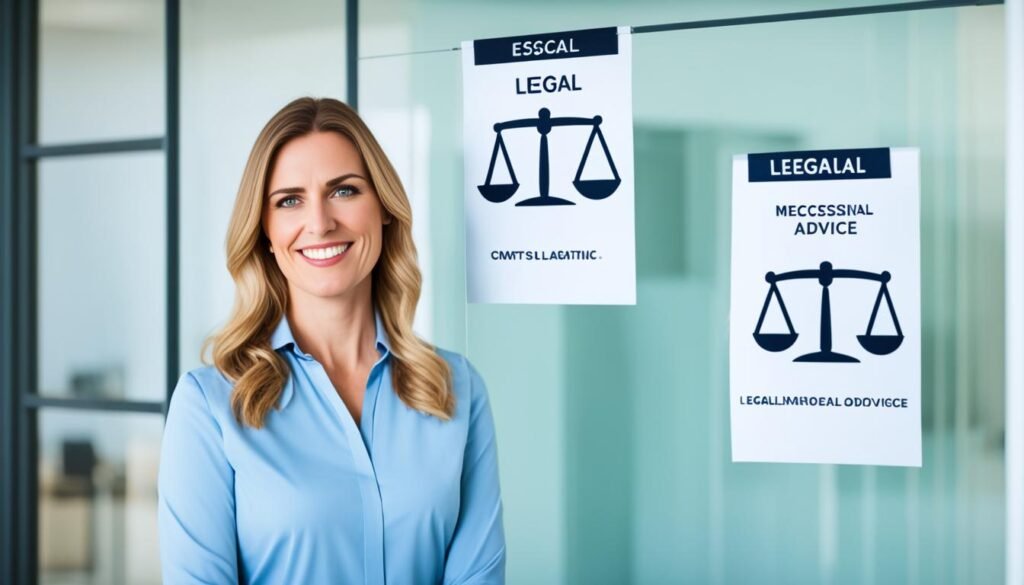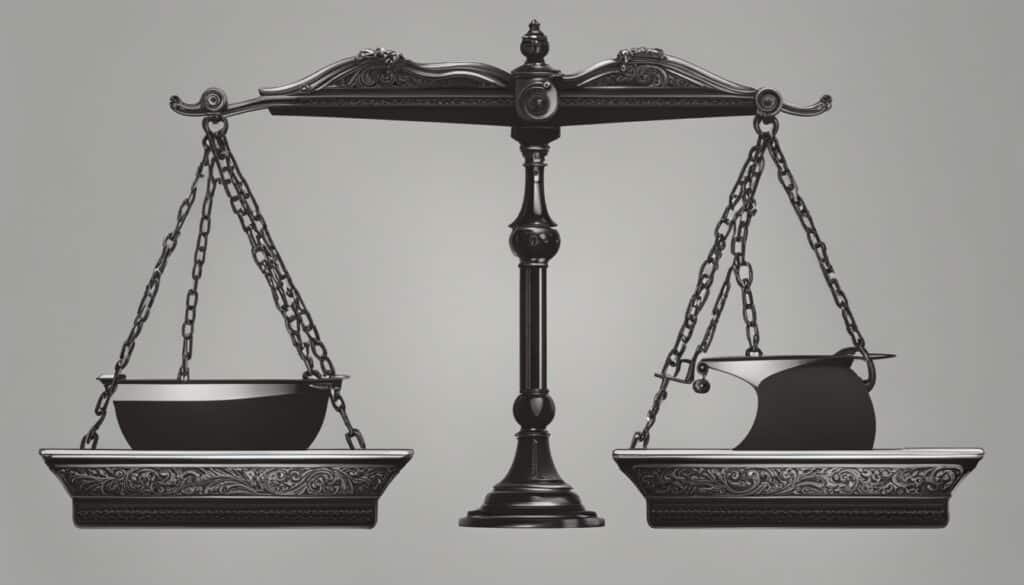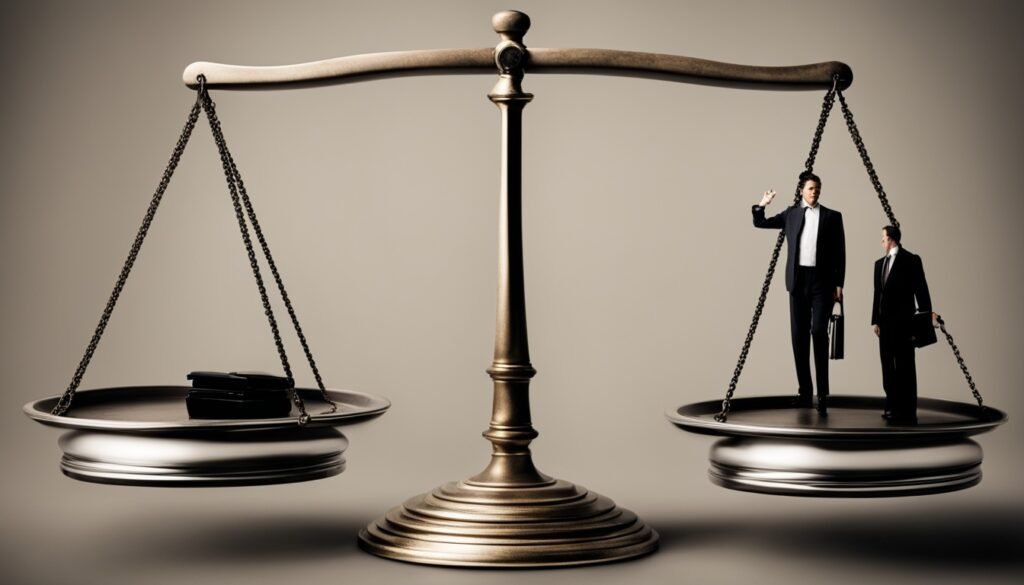Legal advice helps with understanding complex legal matters and disputes. Lawyers give their expert opinions on various issues, aiming to warn clients about possible legal risks. Legal opinions are not promises, but they are very important and the lawyer has a lot of responsibility when giving them.
Also Read: The Role Of Precedent In Modern Legal Practice
The amount of care a lawyer puts into their advice is mostly the same, no matter the size of the issue. Sometimes, lawyers might make some guesses to save their clients money, especially in small cases. Still, the advice they offer is crucial and should be thought over by the client.
Key Takeaways
- Legal advice is essential in navigating complex legal matters and transactions.
- Lawyers provide informed opinions on the legal implications and risks associated with a client’s actions or proposed courses of action.
- The level of due diligence required for a legal opinion is often consistent, regardless of the scale of the matter.
- Lawyers may make certain assumptions to reduce costs for clients, especially in smaller-scale matters.
- Legal advice carries substantial weight and liability for the attorney providing it.
Introduction to Legal Advice
Legal advice is when a lawyer gives you professional legal services. This includes looking at your special situation or problem. Getting legal advice is key when dealing with important legal matters. Knowing exactly when to get advice is important for handling the legal system well and avoiding problems.
Also Read: What Career Opportunities Are Available With A Masters In Special Education?
You might need legal advice for many reasons. It could be for personal things like planning your will or getting a divorce. Or, it might be for business issues like making contracts or following laws. Sometimes, you must get legal expertise. Other times, it’s up to you and how you manage risks.
Knowing the difference between needing legal advice and it being a choice is useful. It helps individuals and companies decide what to do about their legal matters. Getting professional legal counsel means your rights and interests are looked after during legal processes.
| When Legal Advice is Necessary | When Legal Advice is Optional |
|---|---|
|
|
Understanding when legal advice is a must, or when it’s your choice, is important. It lets people and businesses wisely act on their legal matters. This ensures they get the right protection and help through legal processes.
Competence and Scope of Legal Representation

When looking for a lawyer, it’s important to check their legal competence. This will affect how well they handle your case. Also look into the scope of their representation.
Also Read: What Are The Different Levels Of Nursing Education And Their Respective Roles?
Assessing a Lawyer’s Expertise
To gauge a lawyer’s skill, first, look at their experience and what they specialize in. It’s key to find someone who has done well in cases like yours. Their qualifications and any special memberships can also show their skill level.
Defining the Scope of Representation
After you’ve looked at a lawyer’s legal competence, define the scope of their representation. Be clear about what legal issues the lawyer will deal with and their role. This clarity prevents confusion over the lawyer’s role.
| Factors to Consider | Importance |
|---|---|
| Years of Experience | Shows how much the lawyer knows and understands the legal system. |
| Areas of Specialization | Confirms the lawyer can handle your specific legal needs. |
| Track Record of Successful Outcomes | Proves the lawyer’s ability to win cases and help their clients. |
| Professional Memberships and Certifications | Highlights the lawyer’s legal competence and dedication to learning about the law. |
“The key to effective legal representation is the lawyer’s ability to navigate the complexities of the law and deliver the desired outcomes for the client.”
Check the lawyer’s legal competence and the scope of their representation carefully. This step can make sure your legal issues are in good hands. It aims to make your legal experience the best it can be.
Also Read: What Career Pathways Are Available Through Career And Technical Education?
Diligence and Communication in Legal Matters

Good legal help needs hard work and talking clearly. Lawyers must treat cases with great care. They should always talk openly with clients.
Being diligent means doing deep research, thinking things through, and acting fast for the client. Lawyers need to know the newest laws and case rules. They check all proof carefully. Then, they pick out the best legal steps to take.
Staying in touch well is key for good legal help. Lawyers need to know what the client wants and worries about. They keep clients in the loop. And the legal plan must match what the client wants. Talking often, answering fast, and explaining clearly are very important parts of this.
When lawyers work hard and talk well with clients, everyone wins. The case is more likely to end well. Following these rules makes sure clients get great legal help.
Also Read: LEED Exam Accreditation: Career Benefits And Opportunities
| Aspect | Importance |
|---|---|
| Legal Diligence | Thorough research, careful analysis, and timely action on the client’s behalf |
| Client Communication | Understanding the client’s goals, keeping them informed, and aligning the legal strategy |
“Diligence and communication are the cornerstones of successful legal representation. Attorneys who prioritize these principles are more likely to achieve favorable outcomes for their clients.” – John Smith, Legal Analyst
Understanding Legal Fees

Legal fees can be confusing. But it’s important to know how they work to handle costs. You should look at the fee setup, how you’re billed, and the costs your lawyer estimates. This helps you pick the best financial options when you need legal help.
Fee Structures and Billing Practices
There are different ways legal fees can be set. This includes by the hour, as a flat fee, or based on the case outcome. The most usual method is charging by the hour. A set fee is used for certain tasks, like making a will, or for simple law matters.
In some cases, a lawyer will only get paid if you win your case. This is common in personal injury cases. The lawyer’s fee then depends on how much you get in a settlement or court award. It links the lawyer’s success directly to yours.
| Fee Structure | Characteristics | Suitable for |
|---|---|---|
| Hourly Rates | Clients are charged based on the time spent by the attorney on their case. | Most legal matters, especially complex or ongoing cases. |
| Flat Fees | A predetermined lump sum for a specific legal service. | Simple, well-defined legal tasks like drafting a will or handling a basic real estate transaction. |
| Contingency Fees | The attorney’s fee is a percentage of the total settlement or award obtained for the client. | Personal injury cases, where the outcome directly impacts the attorney’s compensation. |
How you’re billed is also important to know. This includes retainers and detailed invoices. A retainer is a payment in advance that locks in the lawyer’s services. Detailed invoices show exactly what you’re paying for.
Understanding fees and billing means you can choose legal services wisely. It also helps you and your lawyer keep costs under control. Always carefully read the fee agreement and talk with your attorney. This makes for a good working relationship.
Confidentiality of Information

Attorneys hold a key role in keeping their clients’ information confidential. The attorney-client privilege is a vital part of our legal system. It ensures discussions between a lawyer and their client are private. This allows clients to speak openly without worrying their secrets will be shared.
Maintaining legal ethics is crucial for lawyers. They should use strong security for their clients’ private information. Also, they must be careful not to accidentally let out privileged communications.
Attorneys must always protect their clients’ secrets, even beyond their business together.
“The attorney-client privilege is the oldest of the privileges for confidential communications known to the common law.” – Upjohn Co. v. United States, 449 U.S. 383 (1981)
Breaking this trust has big effects, like losing your license or damaging the legal system’s reputation. It’s crucial that attorneys keep their client’s confidential information safe.
By being champions of confidentiality and legal ethics, attorneys build trust. This trust lets their clients take part fully in the legal process and get the best results.
Conflict of Interest in Legal Advice

Ethical legal practice means always looking out for conflicts of interest. These conflicts can harm a lawyer’s ability to give good advice and protect their clients. Lawyers should know the rules on conflicts of interest to keep the legal field honest.
General Rules on Conflicts of Interest
One big rule is that lawyers can’t work for two people who want different things. For example, a lawyer can’t help both a buyer and a seller because they might favor one over the other. They also can’t get involved in things that might make them act in a biased way, like if they could make money from the advice they give.
Prohibited Transactions and Former Client Conflicts
Lawyers must think about past jobs too. They can’t take on a new case if it’s too similar to an old one, without the old client’s OK. This stops them from using secrets they learned before. They can’t do business with old clients in ways that might mess with their advice, either.
| Scenario | Conflict of Interest Rule |
|---|---|
| Simultaneous representation of clients with competing interests | Prohibited, as it could lead to biased advice or decisions that prioritize one client’s interests over another’s. |
| Engaging in a transaction or activity that could reasonably be expected to influence the lawyer’s professional judgment | Prohibited, as it could create divided loyalties and undermine the lawyer’s ability to provide objective client representation. |
| Representing a new client in a matter that is substantially related to a former client’s matter | Generally prohibited, unless the former client provides informed consent, to prevent the use of confidential information obtained during the previous representation. |
| Acquiring an ownership interest in a former client’s business or engaging in a business transaction with a former client | Prohibited, unless specific conditions are met, to avoid prohibited transactions that could compromise the lawyer’s professional judgment. |
Following these rules helps lawyers keep their clients’ trust. It also makes sure they stay true to the high standards of the legal field. By doing so, they can give their best and most fair advice.
Legal Advice and Client Impairment

Some clients may not be able to make decisions well due to age, illness, or other reasons. Lawyers have a duty to protect their interests. They do this by making sure their wishes count as much as possible.
It’s important for lawyers to figure out if the client fully understands what’s going on. They look for signs like trouble understanding or speaking clearly. If they spot issues, they change how they talk and might involve the client’s family. If things don’t improve, the lawyer might have to stop helping the client.
Lawyers must always remember to do what’s right by their clients, even if they have trouble deciding things. It’s not always easy to protect the client’s choices and well-being at the same time.
| Considerations for Lawyers When Representing Clients with Impaired Mental Capacity |
|---|
|
By carefully managing issues of client impairment, lawyers meet their responsibilities. They do this while ensuring the legal needs of every client, no matter their state.
“Lawyers must be attentive to signs of cognitive decline and adjust their communication strategies accordingly to ensure the client’s wishes are respected.”
Safekeeping Property and Client Funds

Attorneys have a key role in keeping their client’s property and funds safe. They must set up separate trust accounts for any money involved. This includes handling and keeping track of any client’s belongings carefully. Doing this protects the client’s welfare and keeps the legal world trustworthy.
When it comes to client property and client funds, lawyers should be very careful. Mixing or mismanaging these can lead to serious problems. To meet their fiduciary duties, lawyers have to use special bank accounts just for client money.
These accounts should be totally separate from the lawyer’s own money. They must follow strict rules in how they keep and document every bit of client money. Lawyers also need to keep good records of anything they hold for their clients, like how it’s stored and when it’s returned.
| Safekeeping Responsibilities | Ethical Considerations |
|---|---|
|
|
Failing to protect a client’s funds and property has severe consequences. It can lead to punishment for the lawyer and they might have to pay. Lawyers need to take care of their clients’ money as if it were their own. They must follow the highest standards of doing business properly.
“The most important ethical obligation of a lawyer is to safeguard the property and funds of their clients.” – Legal Ethics Expert
Declining or Terminating Legal Representation

Versatile is the legal landscape, sometimes requiring lawyers to cease representing a client. Such a step entails significant repercussions for both parties involved. Filled with ethical and professional challenges, these situations demand prudent navigation from lawyers. They must prioritize their clients’ legal welfare above all else.
Instances such as conflict of interest often prompt the cessation of legal counsel. When a lawyer’s interests clash with the client’s or that of another, effective and impartial representation becomes unfeasible. This underscores the importance for lawyers to rigorously screen for potential conflicts, upholding their duty to steer clear of such issues.
Financial inability of a client to cover legal fees might necessitate the discontinuation of services. While lawyers may offer pro bono help at times, such support cannot be limitless. It’s essential for attorneys to maintain their financial health to aid more clients down the line. In these cases, a candid conversation about the situation may lead to amicable solutions, including dissolution of the attorney-client agreement.
Lawyers may also confront instances where they lack the required acumen to tackle a case effectively. This could stem from legal dynamics, case intricacies, or their limited experience in a specific field. In recognition of these constraints, attorneys carry an ethical obligation to rectify the situation. This might involve seeking out or recommending a more capable colleague to take over the case.
Communication is key, and a client’s consistent failure to engage with their counsel can be detrimental. It is incumbent upon clients to furnish pertinent details, adhere to advice, and maintain a conduit of open dialogue with their attorneys. Should a client falter in these responsibilities, it might force the attorney to reevaluate their stance on the case.
Concluding legal representation calls for detailed procedures, crucial for protecting the client’s interests. This includes but is not limited to, providing ample warning, refunding any unutilized sums, and potentially aiding in the search for new legal counsel. Neglecting these withdrawal steps can have grave ethical implications and harm the client’s ongoing case.
Reduced to essentials, the choice to decline or cease legal representation is intricate. It demands a balanced approach—considering the client’s welfare, upholding ethical duties, and adhering to professional standards. By handling these intricacies wisely, lawyers contribute to the enhancement of the professional-client relationship and ensure that legal matters transition seamlessly.
| Reason for Declining or Terminating Representation | Ethical Considerations | Withdrawal Procedures |
|---|---|---|
| Conflict of Interest | Lawyers must avoid conflicts of interest and ensure impartial representation. | Provide client with reasonable notice, return unearned fees, and assist in transitioning to a new lawyer. |
| Client’s Inability to Pay | Lawyers are not obligated to provide pro bono services indefinitely and must ensure their financial viability. | Discuss options with the client, including the possibility of terminating the representation, and follow proper withdrawal procedures. |
| Lawyer’s Lack of Competence | Lawyers have an ethical obligation to decline or withdraw from representations that they lack the necessary competence to handle effectively. | Provide client with reasonable notice, return unearned fees, and assist in transitioning to a lawyer with the appropriate expertise. |
| Client’s Failure to Cooperate | Clients have a responsibility to provide relevant information, follow instructions, and maintain open communication with their lawyers. | Provide client with reasonable notice, return unearned fees, and assist in transitioning to a new lawyer or handling the matter on their own. |
Sale of Law Practice and Client Transition

When a law practice changes hands, or a lawyer leaves, making it smooth for clients is key. Lawyers must let their clients know about the change. They need to offer a choice for new legal counsel and move files over correctly. Doing this helps keep trust and look out for clients’ needs during the shift.
Notifying Clients
Upon a law practice sale or change, lawyers should inform their clients quickly. This notice should say the lawyer is leaving, who will now run the practice, and how clients can pick a new lawyer. Clients should have enough time to decide who will represent them next.
Facilitating Client Transition
To make the switch easy for clients, lawyers must transfer important documents and matters to the new firm carefully. They should keep all client info private and handle their legal business with respect. It’s crucial to give clients a clear plan and a schedule for the move to avoid messing up their cases.
Ethical Obligations
In selling their practice, lawyers have ethical duties they must not ignore. They need to get client approval, keep all client info confidential, and not take on jobs that might go against their prior clients. The goal is to always act in their clients’ best interests and make shifting legal services as seamless as possible.
“The sale or transition of a law practice is a significant event that requires careful consideration and adherence to ethical standards to protect the interests of clients.”
By sticking to the right steps and their ethical principles, lawyers can help their clients keep getting top-notch legal help. Even with a change in the law office’s ownership or staff, doing right by their clients means a lot.
Duties to Prospective Clients
When lawyers talk with possible clients, they must follow strict ethical rules. These rules stand even at the first meetings, before they start representing someone legally.
Keeping anything shared secret is a top duty. Lawyers must promise not to use this info against someone, even if they don’t end up being a client.
Lawyers also work hard to dodge any potential conflicts of interest. They double-check their current work and relationships to avoid any problems. They make sure they can fairly represent all clients without any drawbacks.
By sticking to these rules, lawyers show they value honesty in their work. This keeps people trusting the legal help they get.
“Maintaining the confidentiality of information and avoiding conflicts of interest are essential ethical duties that lawyers must uphold, even in their interactions with prospective clients.”
Initial Consultations and Confidentiality
During meetings with lawyers, possible clients may talk about private things. Lawyers must keep these secrets safe. This promise holds, whether the person becomes a client or not.
Avoiding Conflicts of Interest
Lawyers carefully check their other work to make sure it won’t cause problems. They avoid situations where they can’t fully represent everyone’s interests. This way, legal service quality stays high.
Legal Advice
Legal advice is applying expertise to someone’s legal issues. Deciding to get legal advice depends on how complex and important the matter is. It’s key to pick legal counsel who is skilled and meets your needs. Understand what services they offer and their fees.
Good communication, keeping things private, and handling conflicts of interest well are crucial. These steps ensure you get excellent law assistance and professional legal help. Knowing how legal advice works helps people solve their legal problems with more certainty and get the best attorney services.
When is Legal Advice Necessary?
Legal advice is key in tough or risky situations. For example:
- Drafting or reviewing legal contracts
- Dealing with the law for things like estate planning or injury claims
- Tackling legal challenges in business, including legal compliance and employee issues
- When a legal case or dispute goes to court
When is Legal Advice Optional?
Sometimes, legal advice is not a must. This includes:
- Personal everyday matters with few legal impacts
- Standard business deals with usual paperwork
- Clear and simple legal situations
Yet, getting legal counsel can spot risks in even simple cases. This is something many might not see.
The choice to get legal advice depends on how complex and important your legal issue is. Knowing when it’s crucial or just an option helps make wise choices. This ensures getting the right help from attorney services.
Also Read: The Process Of Legislation: From Proposal To Law
Conclusion
Understanding when to get legal advice can be tricky. Knowing about legal competence, fees, confidentiality, and other factors is key. This helps clients figure out when they need a lawyer and how to find one they can trust.
A good relationship between a lawyer and client is vital. It’s necessary for both communicating well and achieving success in the law. No matter the legal issue, getting help from a skilled lawyer ensures your rights are kept safe. Your lawyer will fight for what’s best for you within the legal system.
Learning about legal advice and representation is important. It helps people and companies feel more prepared to deal with legal issues. This knowledge can lead to the best possible results.
FAQs
What is legal advice, and when is it necessary or optional?
Legal advice means giving professional legal help by a lawyer. They use the law to solve your problems. Sometimes, it’s a must-have, especially for complex issues. But, it can also be a choice.
How can a client assess a lawyer’s competence and the scope of legal representation?
To check a lawyer’s skill, look at their experience and wins. Make sure they are right for your case. They should tell you what they will work on and what they won’t.
What are the lawyer’s obligations regarding diligence and communication in legal matters?
Lawyers should work hard and talk with you often. They must do their research, think carefully, and act on time. Good talks help them understand and meet your goals in the case.
How do legal fees and billing practices vary, and what should clients understand?
Costs and payment ways change between lawyers. It’s important to know how they charge you. They should make clear if you’ll pay by the hour, a set fee, or only if they win your case. Also, make sure you understand the bills they send you.
What is the attorney-client privilege, and how do lawyers maintain confidentiality?
The attorney-client privilege keeps your secrets safe between you and your lawyer. Lawyers must make sure no one else knows what you talk about. They must keep your private info confidential.
How do lawyers address potential conflicts of interest in their legal representation?
Lawyers should avoid representing two people with different views on the same matter. They also shouldn’t do anything that might hurt your case. They need to be careful, especially if they once helped someone else in a similar case.
How do lawyers handle situations where a client’s mental capacity or decision-making abilities are impaired?
If you’re not able to make decisions, your lawyer must still act in your best interest. They might need to talk to your family or someone else you trust. In some cases, if they can’t help you properly, they might decide not to take your case or to stop helping you.
What are the lawyer’s responsibilities in safeguarding client property and funds?
Your lawyer must keep your money and other stuff safe. They must use special accounts just for your money. They follow very strict rules to make sure your things are well taken care of.
When can a lawyer decline or terminate their legal representation of a client?
Sometimes, a lawyer might need to stop helping you. This could be because of money issues, lack of knowledge in that area of law, or if you’re not working together well. They always must do this in a way that doesn’t harm you and is also fair and right.
What are the legal and ethical considerations when a law practice is sold or transitioned?
When a lawyer’s place is sold or changes, clients should be told. They must have a say in who will help them next. The process needs to be handled with care and follow strict rules to protect everyone involved.
What ethical duties do lawyers have towards prospective clients, even in initial consultations?
Even when just talking at the start, lawyers must keep private info safe and be fair. They shouldn’t share anything you tell them that could hurt you later. They must put your interests first, even at the very beginning.
Source Links
- https://vsb.org/Site/Site/about/rules-regulations/rpc-part6-sec2.aspx
- https://www.dlapiper.com/en/insights/publications/2021/12/legal-opinions-and-when-to-use-them
- https://en.wikipedia.org/wiki/Right_to_counsel





